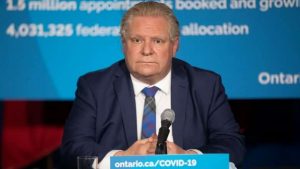Federal government insists it’s up to Ontario to make businesses pay for sick leave

Ottawa is rejecting Ontario’s offer to top up the federal paid sick leave program to $1,000 a week for provincial residents instead of creating its own.
In an April 22 letter to federal Finance Minister Chrystia Freeland obtained by CBC News, Ontario Finance Minister Peter Bethlenfalvy said the province is prepared to immediately double the Canada recovery sickness benefit for every Ontario resident, instead of launching its own paid sick day initiative or making businesses provide paid sick days to employees.
“We believe that this is the simplest and fastest way to increase program uptake and makes this program more effective for those people who are sick, don’t have employer paid sick leave, and need this program the most,” Bethlenfalvy wrote.
The federal government said its wage subsidy program is already in place to help employers pay workers who are on sick leave. And the Canada recovery sickness benefit is designed to support workers who don’t have a regular employer, or as a stop gap until their province mandates paid sick days, Freeland spokesperson Katherine Cuplinskas said in a statement to CBC News.
“When Ontario is ready to mandate sick leave in provincially regulated businesses, as we have done for federally regulated businesses, we will be there to help,” Cuplinskas said.
Trudeau says Freeland working with province
Prime Minister Justin Trudeau told reporters Tuesday that Freeland is working closely with the province to develop its own supports.
“Provinces need to look at the way to deliver sick leave directly through employers, which the federal government can’t do,” he said.
The same day that Belthenfalvy wrote to Freeland, Premier Doug Ford held an emotional news conference and promised workers that his government would create a more robust paid sick leave program than the one provided by the federal government, which is currently $450 per week (after taxes) for a maximum of four weeks.
“I assure you, it is not lost on me that unlike many people I’m able to isolate and continue working. For too many people right now, that’s not the case,” said Ford from the yard of his late mother’s Etobicoke home, where he was in isolation after a staff member tested positive for COVID-19.
But later that day, Ford released a statement saying his government would not “impose any additional burden on the backs of Ontario businesses that have been ravaged by the COVID-19 pandemic.”
This announcement of a provincial sick leave marked a reversal on the Ford government’s stance.
Ford has ignored calls for paid sick leave
For almost the entire pandemic, the premier has ignored repeated demands from Ontario’s own science advisory table, local public health units, mayors, health experts, labour groups and opposition parties to create a program that would make it easier for workers to stay home if they’re ill or experiencing symptoms of COVID-19.
Paid sick days are critical in controlling the spread of COVID-19, said human resource management Prof. Nita Chhinzer at the University of Guelph. But now the conversation is shifting to who is responsible for funding that pay — businesses, the provinces or the federal government.
“There seems to be a bit of finger pointing happening right now,” Chhinzer said. “This political theatre does not help advance this conversation. There needs to be some acceptance of responsibility.”
She said the issue isn’t being addressed quickly enough, with businesses being closed because of outbreaks and workers being sent home without knowing how they’ll afford to pay rent.
In his letter to Freeland, Bethlenfalvy said the province hasn’t seen a high uptake for the federal paid sick days program and believes there needs to be a greater incentive.
“We were hoping that your recent budget would address this issue, and while it didn’t, Ontario is prepared to act now in partnership with your government,” he wrote to Freeland.
When Premier Doug Ford took office in 2018, one of his government’s first moves was to scrap the Liberals’ paid sick days program, along with other labour reforms.
Since then, the Progressive Conservatives have shut down multiple attempts by opposition parties to gain unanimous consent for paid sick leave motions.
On Monday, the provincial government voted down a Liberal bill that would have required employers to provide workers with 10 paid days for medical emergencies.








Redes Sociais - Comentários